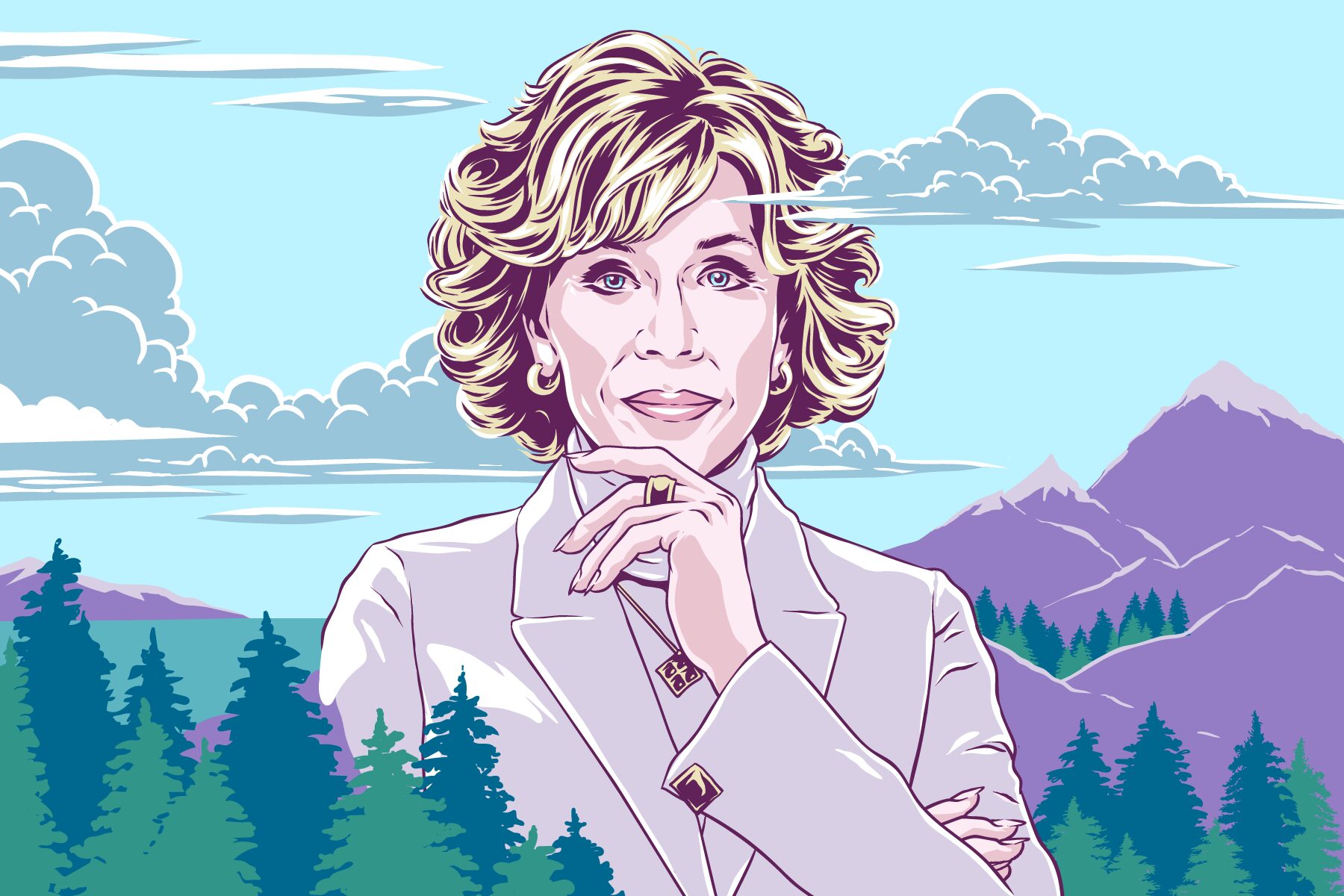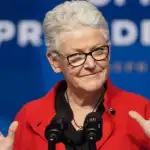In the fall of 2019, police arrested actor and workout icon Jane Fonda on the steps of the U.S. Capitol as she protested the government’s failure to address the urgency of the climate crisis and rallied support for the Green New Deal. Wearing a bright red coat — symbolic of a burning planet — she was led away by police. The then-81-year-old smiled for the cameras with her hands bound in front of her in white plastic handcuffs.
Fonda, who is known for using her platform to advocate for political causes that she cares about, would be arrested a total of five times in 2019 for the protests, which she called “Fire Drill Fridays.” The weekly demonstrations — which were held in partnership with Greenpeace USA — brought together climate activists, celebrities and hundreds of supporters. During the pandemic, they have evolved into virtual events where Fonda still hosts lively conversations about the climate crisis. In 2020 she released a book detailing how she’s moved from grief toward taking action on climate.
Now, in her most significant commitment to fighting the climate crisis yet, she’s launched her own political action committee: the Jane Fonda Climate PAC. The 19th interviewed Fonda via email to learn more about her climate activism, disappointment in President Joe Biden’s decision to expand oil and gas drilling on the nation’s public lands, and how she plans to influence the midterm elections.
This interview has been edited for length and clarity.
Jessica Kutz: You have a long and storied career as an activist. You famously took a stand against the Vietnam War, have been an ally to Indigenous people and an advocate for women’s rights and reproductive justice. In recent years you’ve become more focused on protecting the environment. Of all the political causes that you support, how did you decide to narrow in on climate change when forming your PAC? What was the moment that made you realize this was the issue you needed to act on now?
Jane Fonda: I’d been very depressed, looking for what I should do to best use my platform. Then I read Naomi Klein’s book “On Fire: The Burning Case for a Green New Deal,” which helped me understand the science and how the window of opportunity to do something to avoid catastrophe was rapidly closing. Naomi quoted Greta Thunberg saying, “Our house is on fire. We have to behave like we’re in a crisis because we are.” That lit a fire under me and motivated me to leave my comfort zone. Books have often been catalysts for me in my life.
PACs engage in a wide range of activities, from directing money to candidates to running paid media advertisements. What role will your PAC play in the upcoming elections? And will you also be playing a personal role in endorsing candidates?
There are just four election cycles left before 2030, which is the point of no return when it comes to meeting science-based targets. We urgently need people-powered political organizations that can serve as a direct counter force to the fossil fuel industry and its massive political influence so that we can rid our government of representatives who fail to take a stand on climate action at the scale and ambition that climate science demands.
I’m working closely with my team to endorse candidates up and down the ballot who are prioritizing ambitious climate policies and taking on the fossil fuel industry. But we won’t stop there: We intend to make critical investments in their races in order to defeat politicians backed by the oil and gas executives.
In the video accompanying the launch of your Climate PAC you mention the fact that both political parties receive money from fossil fuel companies. How is your team vetting candidates, and is there criteria apart from how campaigns are financed that you’ll be taking into consideration when deciding which politicians to back?
We will be supporting candidates who stand up to the fossil fuel industry by opposing new fossil fuels and ambitiously winding down existing fossil fuels (in line with what the science demands). Unfortunately, there are Democrats who take money from the fossil fuel industry. So, we aren’t ruling out engaging in primaries where candidates are standing up to candidates backed by oil and gas executives.
Are there any races on your radar ahead of the midterms that your PAC is planning to target in either the House or Senate races? Any specific candidates you already know that you’ll support?
We will be announcing our first round of endorsements soon.
Why did you personally invest in this PAC?
One reason we all save is for security, and right now we are facing the biggest threat to security in history — not just environmental security, but economic health and national security as well. Those who do have resources to share need to pitch in whatever they can to combat the climate crisis now, while we still have a window to change.
The last midterm cycle the fossil fuel industry poured $359 million into political campaigns and lobbying. How are you fundraising, and how much money is your PAC aiming to raise from donations? Have you received any prominent support so far?
Public opinion shows increasing alarm about the climate crisis across both parties, and with Democrats, climate is among the top two issues. Therefore, we have seen incredible enthusiasm from grassroots supporters who are joining our campaign. We will also be raising donations from individuals, similar to myself, who have chosen to invest some of their own assets in helping to save our planet.
Will you be directing support to smaller elections outside of congressional seats?
Yes. There are efforts in state legislatures that are equally critical to addressing the climate crisis and saving our planet. In my home state of California, Democrats hold a supermajority in the legislature, but meaningful climate legislation has stalled and, in some cases, been outright blocked by Democrats backed by the oil and gas industry. Changing this dynamic is exactly why I launched my PAC.
In describing your overall motivation for forming this PAC you mention the need for real climate advocates in office. I’m curious how you would rate the current administration’s actions on climate change thus far? And what legislation or priorities would you like to see implemented in the future that sufficiently addresses the urgency of the climate crisis?
I’m disappointed, frankly, that President Biden has opened public lands for oil and gas development. This flies in the face of his earlier proclamations that indicated he understood that the climate crisis is a true existential one for human beings and the planet. What I’d like to see, and what most climate activists would like to see, is President Biden declaring a climate emergency, which would free up all kinds of financial and political resources for him to bring to bear on this crisis. Another extremely important thing that needs to happen is an ending to taxpayers’ subsidies of the fossil fuel industry.
Currently we give them $20 billion every year. This is unconscionable and must be stopped. One of the provisions in the Build Back Better bill was an ending to these subsidies, but that was removed from the bill because of pressure from a group of moderate Democrats in Texas led by Rep. Henry Cuellar.







